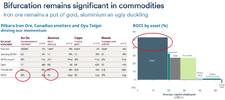Hey guys, just joined up looking to find out a few things about the stock market.
been reading the business section of the australian lately and there has been a few articles in there that have left me with questions
The article states that RIO has lesser production costs involved then BHP does, just wondering how you get those kind of facts.
Another is why LNG prices are underpinned by Oil prices?
Thanks
been reading the business section of the australian lately and there has been a few articles in there that have left me with questions
The article states that RIO has lesser production costs involved then BHP does, just wondering how you get those kind of facts.
Another is why LNG prices are underpinned by Oil prices?
Thanks




